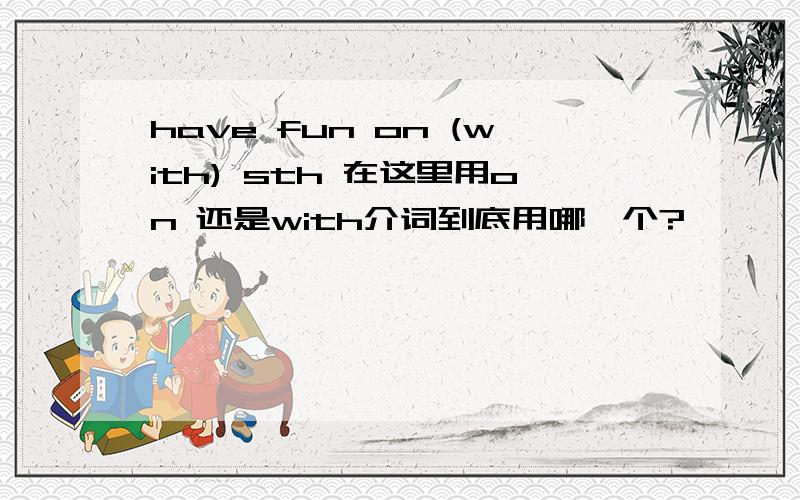have fun on (with) sth 在这里用on 还是with介词到底用哪一个?
来源:学生作业帮助网 编辑:作业帮 时间:2024/11/30 00:57:39

have fun on (with) sth 在这里用on 还是with介词到底用哪一个?
have fun on (with) sth 在这里用on 还是with
介词到底用哪一个?
have fun on (with) sth 在这里用on 还是with介词到底用哪一个?
in和with 都不对.
have fun doing something
设想将来的情况偶尔会说 fun to do something
with
have fun with: 玩得开心
Girls have fun with fashion.
Have fun with water toys!(http://toys.about.com/b/a/257114.htm)
是have fun in doing sth. 介词用in ,不用on 和with
英语专业学生解答
我专门帮你查了一下字典,楼上的解释真够误人子弟的。字典是牛津高阶双解7版。页面是711,大家可以去查。
1.have fun,单独使用,等于enjoy yourself,“尽情的玩吧”的意思。
2.have fun of sb/sth to laugh at sb/sth or make other people laugh at then,usual...
全部展开
英语专业学生解答
我专门帮你查了一下字典,楼上的解释真够误人子弟的。字典是牛津高阶双解7版。页面是711,大家可以去查。
1.have fun,单独使用,等于enjoy yourself,“尽情的玩吧”的意思。
2.have fun of sb/sth to laugh at sb/sth or make other people laugh at then,usually in an unkind way 取笑,嘲笑
=========金山辞典的解释========作为fun的补充===
fun
[fQn]
n.
娱乐, 玩笑, 嬉笑, 有趣的人或事物
vi.
开玩笑
adj.
供娱乐用的
fun
fun
AHD:[f¾n]
D.J.[f(n]
K.K.[f(n]
n.(名词)
A source of enjoyment, amusement, or pleasure.
娱乐活动:给人以娱乐、享受或快乐的活动
Enjoyment; amusement:
愉快;开心:
have fun at the beach.
在海滩玩得很开心
Playful, often noisy, activity.
嬉闹,嬉戏:好玩的、经常喧闹的活动
v.intr.(不及物动词)
funned, fun.ning, funs【非正式用语】
To behave playfully; joke.
嬉闹;开玩笑
adj.Informal (形容词)【非正式用语】
Enjoyable; amusing:
使人愉快的;开心的:
“You're a real fun guy”(Margaret Truman)
“你真是个有趣的人”(玛格丽特·杜鲁门)
for fun或
in fun
As a joke; playfully.
寻找乐趣:开玩笑的;滑稽可笑的
Possibly from fon [to make a fool of]
可能源自 fon [开…的玩笑]
from Middle English fonnen [to fool]
源自 中古英语 fonnen [愚弄]
possibly from fonne [fool]
可能源自 fonne [傻子]
The use of fun as an attributive adjective, as in a fun time, a fun place, most likely originated in a playful reanalysis of the use of the word in sentences such as It is fun to ski, where fun behaves syntactically like an adjective such as amusing or swell. The usage became popular in the 1950's and 1960's, though there is some evidence to suggest that it has 19th-century antecedents. Certainly the sense of this word makes it particularly susceptible to jocular treatment. But as with other such reanalyses (for example, in the expression a whole 'nother ), the usage appears to have persisted after the original flavor had been lost. Thus there is no intimation of humorous intent in a press release that announces:
fun 作为定语形容词使用, 如一段愉快的时光,一个娱乐场所, 极有可能源于对此词在某些句中用法的玩笑性再分析,如滑雪真好玩 从句法功能来讲, fun 在这里的用法象 amusing 或 swell 之类的形容词。 尽管有证据表明19世纪就出现这种用法了,但开始变得流行却在19世纪50,60年代。当然,此词的这层含义尤令人怀疑对方是否在打趣。但正如其他这类再分析词(例如,在句子a whole 'nother 中一样), 此用法在最初的含义都失去之后,还一直坚持使用下来。因此当报界发布以下消息时就从中找不出任何滑稽意味了:
The corporation believes that a spelling bee is a fun way to emphasize the critical importance of good basic communication skills in America's workplace.
公司认为拼字比赛是强调美国工作场所中良好而起码的交际本领的重要性的一种有趣可行的手段。
The day may come when this usage is entirely unremarkable, just as the word talkative has lost all taint of its originally jocular formation from the attachment of a Latinate suffix to a native Anglo-Saxon root. At present, however, the attributive use of fun may still raise eyebrows, and writers who want to stay on the safe side are advised to avoid it in contexts in which a light tone would not be appropriate.
也许总有一天,这一用法会变得完全不引人注意了,正如单词talkative 在其拉丁语后缀与盎格鲁-撒克逊语词根组成词时该词有打趣的意味,但现在已失去其所具有的本义了。 然而,现在使用fun 做定语仍有可能导致误解, 而为保险起见的作家也都会避免在与轻松的语调显得不太协调的行文中使用该词
fun
[fQn]
n.
玩笑, 嬉戏; 娱乐, 乐趣
有趣的人[事物]
具有兴趣的或紧张的场面
be fond of fun
爱闹着玩
be full of fun
很好玩; 极有趣
Her baby is great fun.
她的婴儿很好玩。
I dont see the fun of doing that.
我并不觉得那样做有甚么好玩的。
fun
[fQn]
vi.
(funned; funning) [口]开玩笑; 说笑
He was just funning.
他是在开玩笑。
fun
[fQn]
adj.
供娱乐用的; 为玩玩用的
有趣的; 奇妙的
Fun City
游乐城(纽约市的别号)
a fun person
一个有趣的人
fun fur
(供非正式场合穿着的)低廉毛皮(人造毛皮)外衣
fun house
游乐园(由各种玩乐设备组成的游乐场所)
funabout
[`fQnE9baJt]
n.
游乐用小汽车
funfair
n.
[主英]
游艺集市
露天游乐场
funster
[`fQnstE(r)]
n.
[美]爱逗人笑的人, 幽默家, 喜剧演员
all the fun of the fair
所有的玩艺儿[乐趣]
一股脑儿在内
do not see the fun of
不懂得...的趣味, 不以为有趣
for fun
开玩笑, 不是认真的
in fun
开玩笑, 不是认真的
for the fun of it
为了取乐[好玩, 消遣]
for the fun of the thing
为了取乐[好玩, 消遣]
good fun
有趣的人[事物]
great fun
有趣的人[事物]
have fun (=do a bit of fun)
作乐, 玩乐; 寻欢作乐(特指性交)
have rare fun
玩得非常愉快, 尽量快乐
like fun
[口]有力地; 迅速地; 完全地, 彻底地
[美俚]决不会, 靠不住, 才怪呢
make fun of sb.
嘲弄; 取笑
poke fun at
嘲弄; 取笑
not see the fun
看不出有什么乐趣的地方
缺乏幽默感
What fun !
多么有趣。
fun and games
[口]欢乐, 开玩笑
(男女之间)动手动脚; 拥抱; 性交
[讽]非常困难的任务
fun
来自中古英语fonne愚蠢,笨拙
fun,game,sport,match我们把这四个词分成两组来讨论。
fun 是口语常用词,常见习语有make fun of 开玩笑,逗趣;in (for)fun 取笑地,非认真地
We are making fun of him.
我们在和他开玩笑。
I said it only for (in) fun.
我是说着玩的。
game 在表示“比赛”时,包含着“娱乐”的意思,a game是“一次比赛”或“一局(排球等)”。而games可以表示田径项目的运动会。如Olympic Games.game与fun的含义相同,但使用范围较小。
make game of
不怀好意地取笑别人
Few people ever noticed him,and those that did tended to make game of him.
很少有人理睬他,而凡是理睬他的都倾向于恶意地捉弄他。
A game that is very popular with these young swimmers is the underwater tricycle race.
这些幼小的游泳运动员非常喜爱的一项运动就是水下三轮车比赛。
The Olympic Games will be held in our country in four year's time.
四年后奥林匹克运动会将在我国举行。
For he brought science to the game.
因为他把科学引入了这项运动。
sport在表示“运动”时,亦包含着“娱乐”。sport 的单数形式为一种运动,复数形式为各种运动,但sport(s)总表示户外运动。
Fishing is my favourite sport.
钓鱼是我最喜欢的娱乐。
He made sport of my mistake.
他把我的错误当作笑柄来取笑。
I said it in sport only.
我只是说着玩的。
Mendoza did much to change crude prize fighting into a sport.
为了把粗野的职业拳击变成一项运动,门杜萨作出了许多贡献。
match 表示“比赛”。但它包含“匹敌”的意思
Boxing matches were very popular in England two hundred years ago.
两百年前拳击比赛在英国就很盛行。
fun
amusementenjoymententertainmentjokingpleasuresport
收起